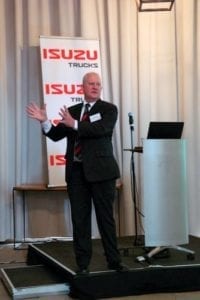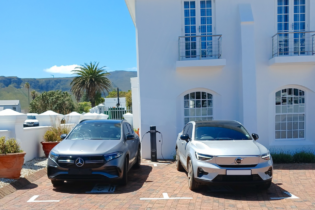“As ITSA, our roles and how we act and present as a company and how we interact with our suppliers and dealers has had to become commercially astute. This is business we’re talking about – not trucks – it is a business model, it’s an enterprising model that needs thought. While there is a lot of doing, we need a lot more thinking around what we need to do. That’s what changes the value and that’s what moves the mind.
“We could have built a R500 million plant in Coega. But the opportunity, the success, the timing, is unknown. If you’re going to establish a business and you want to be viable and sustainable in the short-term to get you to where you want to go, then you need to be scalable. “The question you need to ask yourself is: Can you sustain that scale in the short-term, until the success eventually comes – which may never come – and are you still going to be sustainable and viable and around when the cookie starts to crumble? “We took a conservative, astute perspective of what our economy of scale needs to look like and how we leverage our opportunity. One thing we’ve learned in Africa is that things go wrong. You need to make sure your scale is correct if you want to make it through choppy waters. Our enterprise is correctly scaled at this point in time and we’re looking at the graphs so that we can run with it on a scale basis. “In January 2014 we appointed a new distributor in Nigeria after a lot of discussions and negotiations. We went through a nice process where they ordered some good volumes from Isuzu through most of 2014. “During the year they sourced new product from us it [that volume] equated to our biggest dealer’s volume in South Africa. But when the oil crises hit and the political and security issues changed, it crashed. Right now nothing is happening whereas 12 months ago, everyone was talking about how big the Nigerian economy was and how it had overtaken South Africa’s economy. That’s a classic example of how volatile Africa is. “If we’d have thrown all our people into Nigeria and put offices in there, we would’ve closed them down within six months and brought them all back. Africa is a challenge and there is very little rulebook or textbook to follow. You need to be very common-sensical, rational and logical and be aware of the volatilities. “If you’re going to enter markets like that, get your scale right, get your base right because it will turn on you. When things are running, people run with you and when things get tough they run for the hills. Our business and customers don’t expect partners to run when times get tough – that’s when they need them the most,” he concludes.
“We’re building business and creating economies of scale into the future”, says Craig Uren, COO at Isuzu Truck South Africa (ITSA).
ITSA is involved in nine countries/territories in Africa. “The business won’t necessarily be sustainable if we only look at our own market in South Africa. Big multinational companies need to have critical mass and the markets etc.”
Isuzu Motors sub-Saharan Africa (IMSA) meanwhile, was created in January this year and is located in the same Johannesburg building as ITSA. “They have a specific focus on their territories because the dynamics are so different. It doesn’t help to try and be all things to everyone,” he says.
Uren explains that while there are opportunities in Africa, timing, quantities and degrees of success are largely unknown. “If you’re ready and have a business and a process that can be scaled up and down quite quickly, you can make use of those benefits.”
ITSA supplies the odd truck to Kenya, a country that Uren says is going to outsell South Africa this year. “We’ll do around 4 500 units, but Kenya will probably do 5 000 at least. East Africa is flying. From an IMSA perspective, they have their own source of products that are specific to those territories. The assembly operation in Kenya is quite significant and equal to the volumes we do here.”
African markets are challenged by a lack of commonality, he says. “We are starting to provide common business solutions, used here, into those areas in terms of vehicle body, model and specification. They want the same aftersales service, which in Africa has never really happened before.”
ITSA will provide a large portion of future enterprising products and services that IMSA can benefit from. “It’s good that we’re in the same building; we have different focuses and different territories, but Isuzu is looking at the continent of Africa by virtue of what the consumer needs in each territory. You can’t have one solution that covers all of it.








